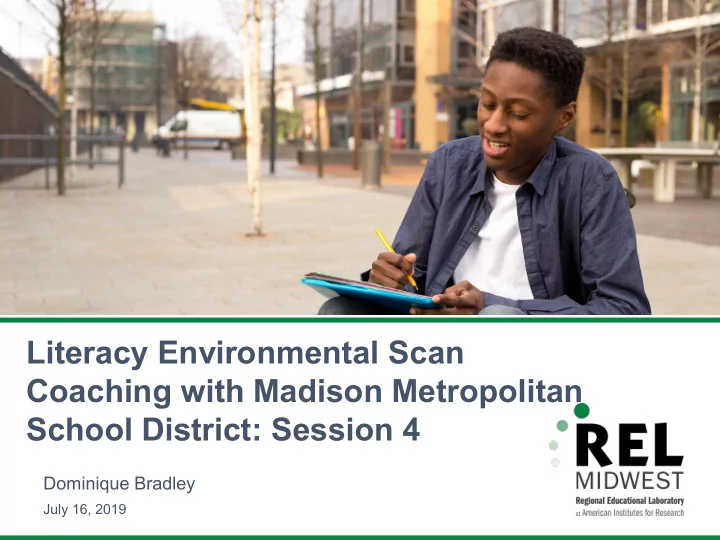

Literacy Environmental Scan Coaching with Madison Metropolitan School District: Session 4 Dominique Bradley July 16, 2019
Agenda 1. Project progress review 2. Final report planning Closing and next steps 3.
Session goals 1. Review our progress. 2. Engage in analysis and sensemaking activity. 3. Develop a structure for final report. 4. Discuss session 5 presentation. 5. Establish next steps.
Project progress review
Project process map
Primary research questions 1–3 RQ1. How are decisions being made about which interventions to offer? Who is making those decisions? RQ2. How are K–12 literacy interventions being implemented? How are students being identified and referred for service/intervention? a) What staff is involved in carrying out the interventions? b) What instructional time is allocated for the interventions? RQ3. How are interventions being implemented with fidelity? (See implementation model in figure 1.) a) How is intervention implementation being monitored and assessed? Using what data sources? b) How is quality implementation being supported by the schools and district? c) How well does the intervention implementation align to implementation as intended by the developer of the interventions?
Critical components of implementation Shared ownership model Logistical supports (dictated Collective planning by intervention) Time allocated Teacher supports for intervention Using data to (duration and make decisions frequency) Appropriate Training in intervention Ongoing professional physical implementation, literacy, and Involves development resources language acquisition primary (textbooks, implementers, materials etc.) coaches, administration
Research design 1. Complete an inventory of K–12 literacy interventions being used in the district. 2. Qualitative phase: a) Interview all middle and high school staff overseeing delivery of literacy interventions for struggling learners. This phase may involve focus groups or one- on-one interviews, depending on the school.
Project goals Primary goals • Reveal the extent of alignment of intervention use across schools and grades. • Document the level of fidelity with which interventions are implemented. • Test our model of critical components for high level of fidelity of implementation. Utility of the scan • Assist the district office in decisionmaking and identifying how best to support schools as they select and implement different literacy interventions.
Project products: Literacy interventions inventory Complete an inventory of in-school literacy interventions being utilized in the district to: • Identify and address missing data in the current inventory. • Document what is being offered in schools where the district does not have school-level information. • Document interventions being implemented in schools that the district is not aware of. • Identify and document alignment across schools, grade levels, and participating student groups.
Project products: Final report 1. Historical context with which the district has approached literacy interventions 2. Broad overview of alignment across the district in offerings and supports i. Will use inventory and interview data and will focus on fidelity of implementation and gaps in support or administration 3. Implementation profiles of interventions of interest Profiles will include information about select programs, including: • How decisions are being made about which interventions to implement. • How literacy interventions are being implemented. • Whether interventions being implemented with fidelity?
Roles and responsibilities REL Midwest will: • Assist MMSD in creating the final report and other research products.
Roles and responsibilities MMSD will: • Participate in collaborative analysis and interpretation. • Collaborate to write the final report. • Provide feedback on other related project products (infographic).
Final report planning
Report writing considerations
Report writing considerations
Who is your audience? Superintendent? School board? Other divisions? General public?
What’s the goal?
Research report standard format Introduction The hook. Driving questions. Relevant background information. Key findings. Methodology Sampling frame. Tools developed and used. Body (longer reports) Describe your findings in detail. Closing Highlight key findings. Implications or recommendations. Limitations of your study.
Activity: Analysis and sensemaking
Let’s map this out How does our analysis connect to the research questions?
How can we use our analysis to “speak” to each of these? RQ1. How are decisions being made about which interventions to offer? Who is making those decisions? RQ2. How are K–12 literacy interventions being implemented? How are students being identified and referred for service/intervention? a) What staff is involved in carrying out the interventions? b) What instructional time is allocated for the interventions?
RQ3. How are interventions being implemented with fidelity? a) How is intervention implementation being monitored and assessed? Using what data sources? a) How is quality implementation being supported by the schools and district? b) How well does the intervention implementation align to implementation as intended by the developer of the interventions?
Final report planning continued
Report writing considerations
Further considerations • How much context or historical information will the reader need? • Should the report include recommendations? For what audience? • Are multiple formats appropriate for this report?
Let’s work! Our tasks: 1. Develop an outline. 2. Finalize report formats 3. Assign roles.
Next steps
Next steps for session 5 • Determine goals • Identify appropriate participants • Assign roles
See you next time!
Dominique Bradley dbradley@air.org
Recommend
More recommend